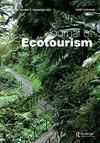Can ecotourism interpretation influence reef protective behaviours? Findings from a quasi-experimental field study involving a virtual reality game
IF 2.4
Q2 HOSPITALITY, LEISURE, SPORT & TOURISM
引用次数: 2
Abstract
ABSTRACT The study of pro-environmental tourist behaviours (PEB) frequently relies on self-reported measures of intentions and/or attitudes. Issues with these approaches are reviewed and compared with quasi-experimental field studies that measure actual behaviour and are higher in external validity. The research note argues for an expansion of these studies’ contexts, the interventions used in experimental conditions and types of PEB measured as outcome variables. By way of example, a small between-subject quasi-experiment is presented, using an innovative virtual reality game developed by the author to encourage tourists’ connection with Australia's Great Barrier Reef.Passengers were presented with the game and a control condition (a VR video) on alternate days. The recorded behaviour was their selection of a thank you gift from the options, including one target PEB (conservation donations). The aim of this research note is prompt greater consideration of how we might measure actual PEBs in (eco)tourism studies.生态旅游解说能影响珊瑚礁保护行为吗?一项涉及虚拟现实游戏的准实验实地研究的结果
摘要:对环保游客行为(PEB)的研究经常依赖于自我报告的意图和/或态度测量。对这些方法的问题进行了回顾,并将其与测量实际行为且外部有效性较高的准实验现场研究进行了比较。研究说明主张扩大这些研究的背景、实验条件下使用的干预措施以及作为结果变量测量的PEB类型。举个例子,利用作者开发的一款创新的虚拟现实游戏来鼓励游客与澳大利亚大堡礁建立联系,提出了一个小的受试者间准实验。每隔一天向乘客展示游戏和控制条件(VR视频)。记录的行为是他们从选项中选择了一份感谢礼物,其中包括一份目标PEB(保护捐赠)。本研究报告的目的是促使我们更多地考虑如何在(生态)旅游研究中衡量实际的PEB。
本文章由计算机程序翻译,如有差异,请以英文原文为准。
求助全文
约1分钟内获得全文
求助全文
来源期刊

Journal of Ecotourism
Social Sciences-Geography, Planning and Development
CiteScore
6.40
自引率
12.50%
发文量
32
期刊介绍:
The Journal of Ecotourism seeks to advance the field by examining the social, economic, and ecological aspects of ecotourism at a number of scales, and including regions from around the world. Journal of Ecotourism welcomes conceptual, theoretical, and empirical research, particularly where it contributes to the dissemination of new ideas and models of ecotourism planning, development, management, and good practice. While the focus of the journal rests on a type of tourism based principally on natural history - along with other associated features of the man-land nexus - it will consider papers which investigate ecotourism as part of a broader nature based tourism, as well as those works which compare or contrast ecotourism/ists with other forms of tourism/ists.
 求助内容:
求助内容: 应助结果提醒方式:
应助结果提醒方式:


